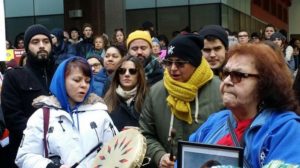Remembering the Missing and Murdered Indigenous Women

By Barb Nahwegahbow
TORONTO—On Valentine’s Day, Toronto’s Strawberry Ceremony honoured the women and girls in our community who have been murdered or who have gone missing. People crowded into the courtyard of Toronto Police Headquarters at Yonge and College to remember the Indigenous women whose lives were cut short by violence, leaving families and communities to grieve their loss. Posters and placards with photos and names of women were held up or worn by family and community members.
This is the 12th year the ceremony has been held. Mi’kmaq Elder Wanda Whitebird remarked this has been the mildest day in the history of the ceremony.
“We’ve been here in snowstorms and rainstorms,” she recalled. At last year’s ceremony, it was a bone-chilling -22C.
“Every year on this date and at this time for the last 12 years, we have gathered in this space and we ask our ancestors to come and join us today to celebrate life,” said Whitebird in her opening prayer. “We want the families of the missing and murdered women to know that we love them and we stand with them and today we celebrate the lives of those women who have gone on.”
Whitebird called on the spirits of those women to join the ceremony and to hear the songs.
The Eaglewoman Singers led a welcoming song and a song to honour and protect the waters as strawberries and water were given to the participants for offerings.
The line-up of speakers included many who have personally experienced the loss of a loved one. Guest speaker Mag Cywink from Whitefish River First Nation whose 31-year old sister, Sonya Cywink was murdered in August, 1994. Her killer has never been found.
“We stand in sacred solidarity with the families of the missing and murdered,” said Cywink. “It’s not just a family and community problem. It is a national problem and we are the solution.”
Joyce Carpenter of Alderville First Nation, another speaker at the ceremony, spoke about her 14-year old daughter, Patricia (Trish) whose body was found at a construction site in downtown Toronto on September 25, 1992. Her death was ruled ‘suspicious’ by the coroner and it remains unresolved.
“This is a national tragedy that has to stop,” said Carpenter holding back her tears. “It has to stop and we’re the only ones that can stop it.”
The group marched from Yonge and College to the YMCA at Yonge and Grosvenor for a feast prepared and served by Native Men’s Residence.
In an interview following the Feast, Denise General of Six Nations said this was her first time at the ceremony. Her 21-year old daughter Tashina General was almost five months pregnant when she was murdered by the father of her unborn baby. She went missing on January 22, 2008 and her body was found buried behind the boyfriend’s house on April 25 2008. In 2011, Kent Owen Hill was convicted of second degree murder and sentenced to life in prison. He appealed the conviction and in November 2016, he pleaded guilty to manslaughter and sentenced to time already served.
“We were going to name the baby Tucker because it was a boy,” stated General.
Organizer of Silence No More, Audrey Huntley, said that she was disappointed at the reduced number in attendance at the ceremony. About 500 people attended this year whereas previously up to 1,500 – 2,000 people came out.
“Things like the public inquiry that’s happening can take the steam out of a political movement because people think ‘oh, this is all being taken care of’,” stated Huntley. “We believe the only way to end the violence is getting rid of the settler colonial project. We don’t believe that state-led initiatives will bring real change. At the end of the day, they’re going to uphold the status quo. Change is going to mean decolonization and no government is going to do that. It’s important for people to continue to support the grassroots and the political organizing. For the families, this isn’t just one day of the year for them. They’re grieving every day, all year round.”


